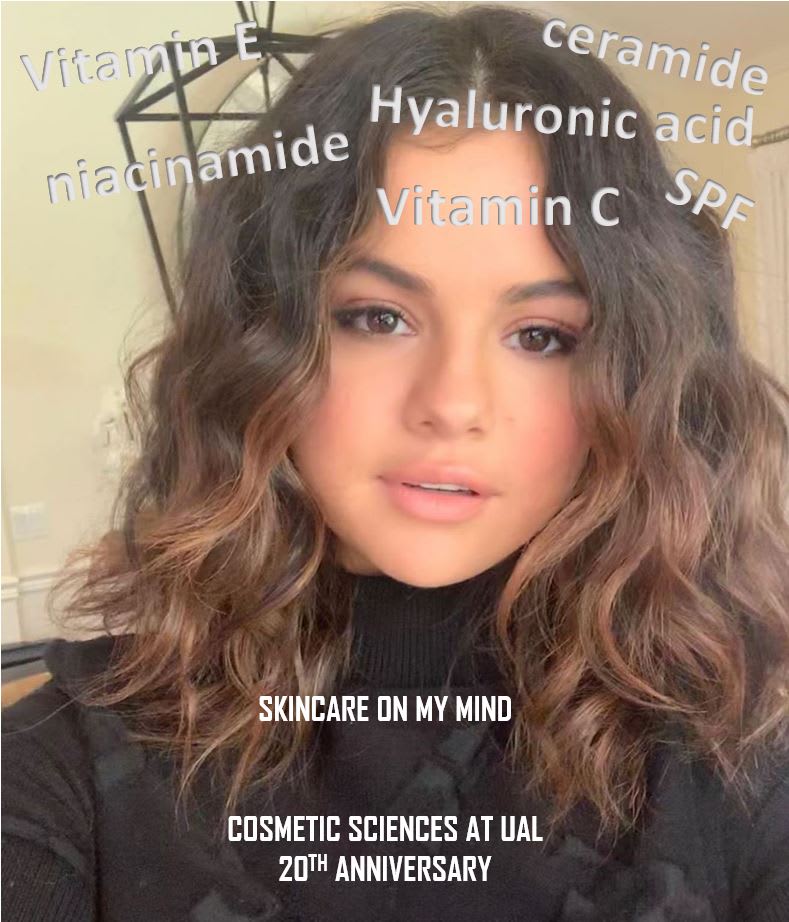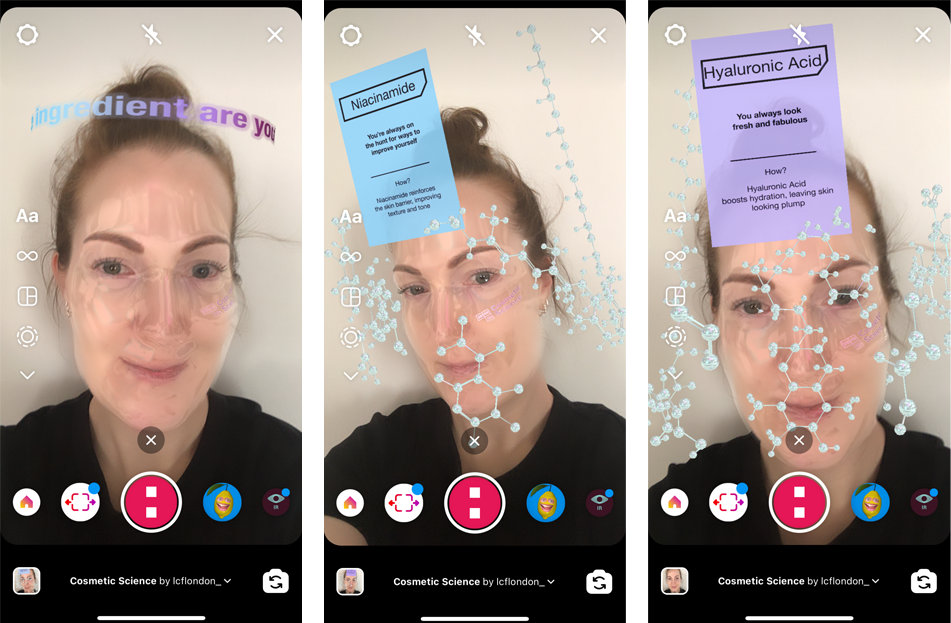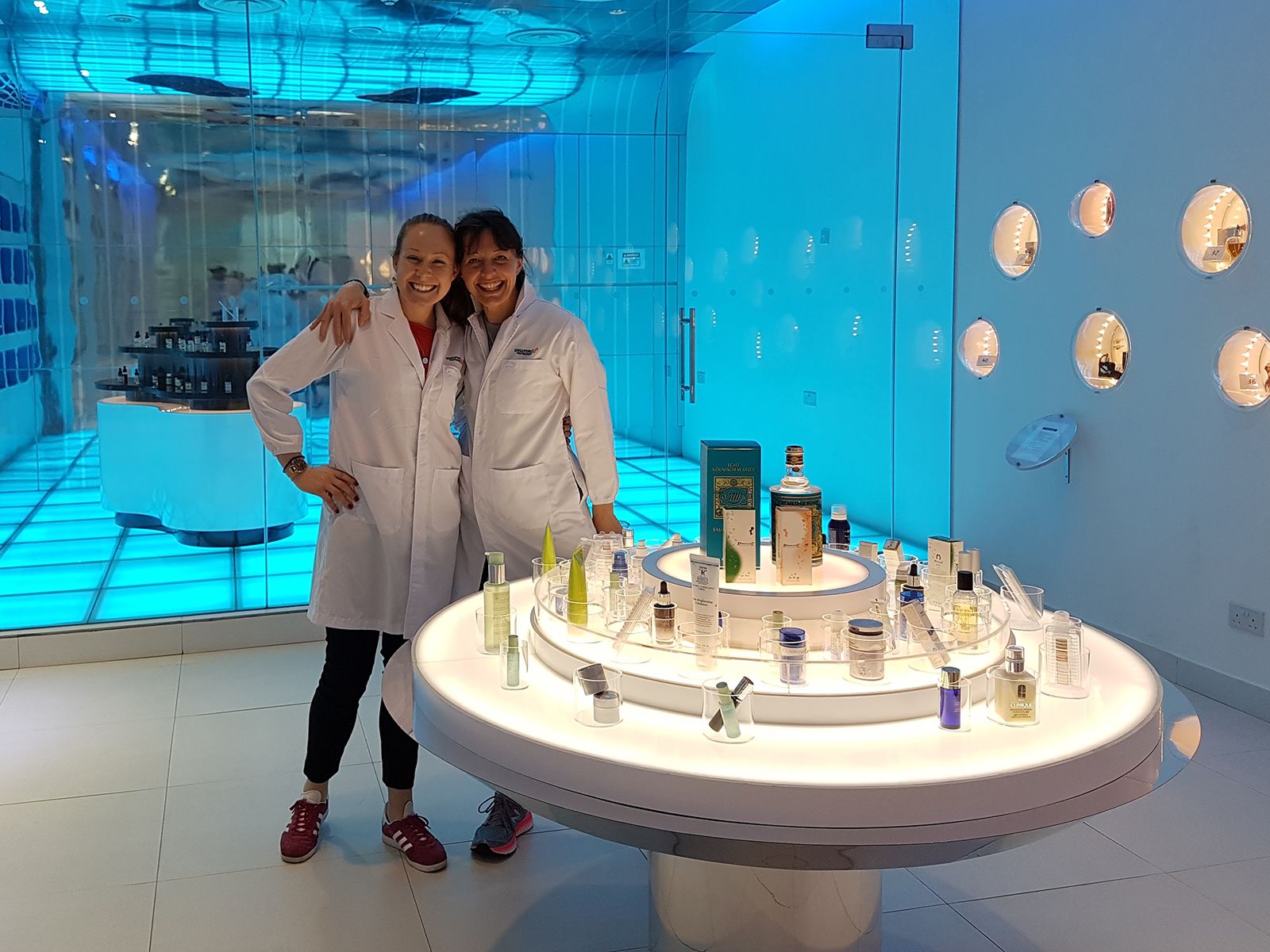
MSc Cosmetic Science students conceptualise interactive Instagram filter

- Written byJ Tilley
- Published date 11 June 2021

This year, LCF celebrates 20 strong years of Cosmetic Science. For the majority of the past 20 years, the MSc Cosmetic Science course at LCF remained the only course of its kind in the UK and across the world, equipping students with both the hard and soft skills required to pursue a successful career in the industry. Aside from working within cosmetic science, the course also provides graduates with the foundations to begin a career in a variety of sectors including from manufacturing to aviation. To celebrate the 20th birthday, current MSc Cosmetic Science students, Samita Verma and Natasha Malhi, came up with a concept for an interactive Instagram filter that allows users to find out more about the active ingredients in our every day cosmetics. The filter was then designed by MA Fashion Futures graduate Marie Schaller. We caught up with them to find out about the design process and how users can utilise their new found knowledge of the chemical elements.
The Instagram filter looks great! So tell us, where did you start?
Natasha: One of the most important things for us to do was to, first, assess which aspect of this course we wanted to showcase. For us, it was the side of science and formulation that the cosmetics industry doesn't talk about as much. Both of us love the formulation aspects of cosmetic science and how different ingredients contribute towards an overall goal of a skincare product. But more than that, we wanted to highlight how much we enjoyed the course and how fun we actually find it, which is why we decided to make the filter personalised and interactive. As it attributed towards our own experience of our time on this course.
Samita: Actually, Natasha began with developing the IG filter prototypes. She conceptulaised four amazing filters that focused on highlighting both the scientific and inventiveness of creating cosmetics and personal care products. We shared the designs with our cohort to see what everyone thought best represented our course and what we do. Everyone seemed to prefer two prototypes in particular, so we combined the two designs together to result in our final product. To especially highlight the significance of the individual ingredients or actives in skincare, we included the chemical formulas to add a visual aspect to the filter. Like our course, our interactive filter is the perfect synergistic blend of both the science and arts.
When coming up with it, what were your aims? What are you hoping people will experience when using it?
Natasha: Our main aim for this filter was to celebrate this very unique course. It’s blend of scientific theoretical background and its creative and quite artistic side of the course, which is personally, one of the reasons I decided to enrol. We also hope to increase the awareness of this, relatively new, course. By personifying the function of different active ingredients we hope to bring awareness to commonly used ingredients, and their key function in formulations.
Samita: Consumers often overlook the breadth of scientific research and lab work that is required when creating a standard shampoo or mascara. It was important that the filter reflected the scientific aspect of our course and industry just as much as the creative aspect. The chemical formulations of the raw materials are able to illustrate how these individual molecules come together to form the final formulation that functions at a physiological level to give consumers the desired effects. The interactive filter asks “What cosmetic active ingredient are you?" in an effort to introduce users to the scientific function of the active ingredient, while providing an analogy to help explain the impact of the ingredient.

The elements give an insight into cosmetics that many of us won’t be familiar with. Do you find you are more selective when choosing cosmetic products knowing what you know?
Natasha: Yes of course! As you would with anything you specialise in, your consumer behaviour automatically changes. I am a lot more vigilant and aware when it comes to “selling claims”. The media perpetuates a cloud of fear behind the chemicals used in cosmetics with little to no reference to the actual formulation practices and the laws behind them. This is what allows brands to claim to be “cruelty free” when in fact the EU has banned animal testing since 2009. Since studying the course I have also found myself paying more attention to the ingredients list at the back of cosmetics and using that to guide my purchasing decisions rather than marketing claims.
Samita: I am absolutely more selective when purchasing products! Whenever I reach for a cosmetic product, I find myself immediately turning to the ingredients list to check the specific raw materials and their corresponding amounts included in the formulation. If the formulation is pretty basic, I tend to stay away from it. I’m more inclined to purchase products based on their ingredients listing or associated claims rather than hype or marketing. I also stay away from products with fear-mongering claims such as paraben-free, alcohol-free or sulfate-free. These ingredients are perfectly safe to use and are highly regulated so only appropriate amounts are included in the products sold in the market. It is important to remember, if it was not safe, they wouldn’t be able to sell them!
The IG filter is to celebrate 20 fantastic years of cosmetic science at LCF – how do you envision cosmetic science and the industry in the next 20 years?
Natasha: Needless to say that the cosmetics industry has seen a massive boom in popularity in recent years, but I also believe that the industry is heavily guided by consumer beliefs and morals and being very responsive to the needs of its consumers, which is something I really value. We have recently seen a great shift into brands celebrating diversity and inclusivity as well as becoming more accountable with their waste management and use of plastics. In the next 20 years I see the cosmetics industry really ramping up their sense of ethical responsibility, becoming more transparent and aware of what ingredients they are sourcing etc. I also see the cosmetics industry becoming more label-free in the sense of creating products for both men and women and changing their marketing and advertising accordingly.
Samita: In the next two decades, the personal care and cosmetics industry will transition to focus on creating sustainable and inclusive products that can be customised for their consumers. Novel technology and personalised formulations will be aimed to allow consumers to custom-tailor beauty products that would target their specific concerns. Brands will strive to surpass Fenty Beauty’s level of inclusivity, creating products that celebrate individuality.
Hopefully, the biggest change in the next 20 years is in the composition, manufacturing, and distribution of the products. With the water crisis on the horizon and CO2 emissions on the rise, the industry should be shifting towards more sustainable formulations and manufacturing processes. Waterless products will become the norm by limiting the use of water to create more concentrated and effective products. Energy-efficient manufacturing and the reduction of waste products created will also become standard practice in the industry.

We recently interviewed a cosmetic science alum who - after a very successful career in the industry – has gone on to become a pilot. What transferable skills would you say that the cosmetic science course provides you with?
Natasha: One of the great things I love about this course is its breadth of specialisations. Our formulation units really polish our attention to detail and practice of mathematical and chemical equations. Pilots would of course need to have an immaculate attention to detail on the job.
Our legislation units allow us to remember facts about the different laws between markets, and I'm sure pilots would have to be aware of the legislation from different jurisdictional areas. We also cover units such as marketing and perfumery which allows us to see the bigger picture of different elements coming together as well as consider consumer behaviours which is something that pilots would have to be sensitive towards considering the fact that many are still apprehensive about flying. Throughout our degree we practice public speaking, a skill used in a number of different careers.
Samita: The cosmetic science course, although heavily focused on the scientific aspect of creating products, is a multidisciplinary course that touches on areas such as marketing, legislation, and supply chain logistics. The variety of courses we take provide a holistic understanding of the NPD process and prepare us to work in a variety of roles in R&D, marketing, compliance, and even sales. The tutors place an emphasis on showing curiosity, critical thinking, and research skills; all skills that can be applied to any position. Through collaborative team projects, we develop teamwork, conflict resolution, and communication skills. We are able to further enhance our verbal and written communication skills through presentations and the writing of various kinds of reports. To me, the most important skill I’ve gained from this course is self-motivation and self-satisfaction. As we are typically left alone to work on our projects alone or with others, it is up to us to manage our time and motivate ourselves to get the work done. It is not just the grades that give us a sense of pride, but also any semblance of self-improvement.
- Book onto a virtual open day for this course
- Explore LCF undergraduate and postgraduate courses
- What’s on at LCF: open days and events
- More LCF Stories
